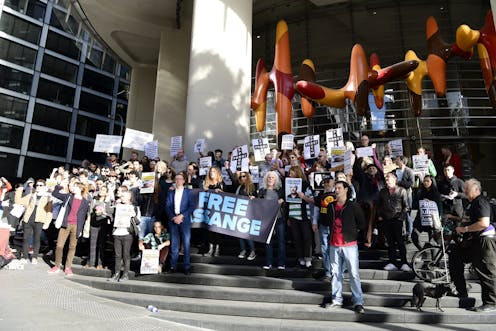letting the fox guard the henhouse
- Written by Denis Muller, Senior Research Fellow in the Centre for Advancing Journalism, University of Melbourne

Fox guarding the henhouse; poacher in charge of the game-keeping. Choose your idiom, but appointing the parliamentary joint committee on intelligence and security to inquire into press freedom is guaranteed to get the opposite result to what is ostensibly intended.
The committee – called PJCIS for short – is part of the problem that the inquiry is meant to solve.
Proposing that it lead the quest for a solution shows the inquiry for what it is – a public relations exercise designed to buy time until the hue and cry over last month’s raids by the Australian Federal Police on two media organisations dies down.
Read more: Explainer: what are the media companies' challenges to the AFP raids about?
The inquiry is due to report on October 17. That will be four months after the raids on the home of a News Corp reporter and the headquarters of the ABC, which provoked a powerful reaction last week from the heads of the ABC, News Corp and Nine in a panel at the National Press Club. They were united in calling for far-reaching changes to Australia’s secrecy, national security and whistleblower laws.
The government’s strategy is transparently obvious. For the next four months, it can bat away pressure for reform by saying everyone should wait and see what the PJCIS comes up with.
However, any proposal to do something substantive about reforming the oppressive regime of secrecy and national security laws will generate severe blowback from the intelligence services, the federal police, and the bureaucracy in general.
They love secrecy and hate disclosure. They devised the current regime in the first place, and the PJCIS waved it through in successive tranches of legislation, often in a rush with no time for a thorough review by parliament.
Read more: Media chiefs unite on press freedom, but will it result in any action?
The result is that Australia now has more than 70 pieces of national security legislation, the vast bulk of them passed in the 18 years since the September 11, 2001 terror attacks. They are laced with criminal sanctions against journalism. Where a public-interest defence is available, the onus is on journalists to prove their defence rather than on the prosecution to prove guilt.
On top of that are the general government secrecy laws contained in Part 5.6 of the Commonwealth Criminal Code, which are written so broadly as to encompass any government information at all. They, too, provide for criminal sanctions against journalists, as well as whistleblowers.
The Public Interest Disclosure Act, which is designed to give the impression that whistleblowers are protected, is a complete piece of window-dressing. We are seeing now how this plays out with the prosecutions of two whistleblowers, Richard Boyle, formerly of the Tax Office, and David McBride, formerly of the Defence Department, for making disclosures that were clearly in the public interest.
Then there are the warrant systems designed to give the impression that journalists can offer some protection to confidential sources and that media organisations cannot be arbitrarily raided by the police. The impression that the warrants are subject to judicial review is simply illusory. The warrant for the raid on the ABC last month, for instance, was issued by a local court registrar in Queanbeyan.
The three media bosses were unanimous in telling National Press Club on June 26 what needs to be done:
decriminalise journalism
narrow the scope of national security laws so sanctions against journalists apply only when a serious issue of national security is at stake
fix the whistleblower laws so they really do protect public-interest disclosures
make warrants contestable in the courts and subject to proper judicial review
take action to counter the culture of secrecy that, as Hugh Marks, CEO of Nine, put it, has become “a twisted default position” for government agencies.
The media bosses say no inquiry is needed to establish this. Naturally, however, they are going along with the PJCIS inquiry, and had talks with the Attorney-General Christian Porter this week over the reforms they want.
Read more: Four laws that need urgent reform to protect both national security and press freedom
The terms of reference for the inquiry, as reported in The Australian, include:
finding out from journalists what it is like being the subject of police or intelligence operations and what impact it has on their work
determining whether any changes can be made to legal procedures and thresholds to rebalance press freedom and national security considerations
assessing whether there should be contested hearings over warrants
evaluating the appropriateness of allowing police and intelligence services to access electronic data held by media organisations.
There’s nothing in there about decriminalising journalism, narrowing the scope of national security, or making the whistleblower laws work. And of course, there’s nothing about the culture of secrecy in this country.
Labor is proposing a cross-party Senate inquiry which, given the numbers in the Senate, stands a chance of getting up.
Meanwhile, it would be a triumph of hope over experience to expect the PJCIS to come up with anything like a regime to enable the press to exert the kind of scrutiny on government that democracy requires.
Authors: Denis Muller, Senior Research Fellow in the Centre for Advancing Journalism, University of Melbourne





